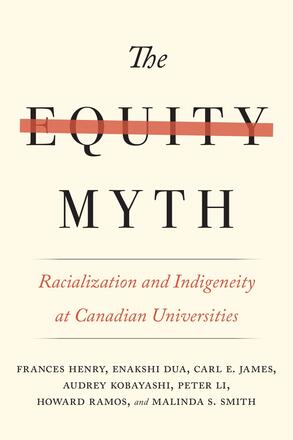
The Equity Myth
Racialization and Indigeneity at Canadian Universities
Description
The university is often regarded as a bastion of liberal democracy where equity and diversity are vigorously promoted. In reality, the university still excludes many people and is a site of racialization that is subtle, complex, and sophisticated. This book, the first comprehensive, data-based study of racialized and Indigenous faculty members’ experiences in Canadian universities, challenges the myth of equity in higher education. Drawing on a rich body of survey data, interviews, and analysis of universities’ stated policies, leading scholars scrutinize what universities have done and question the effectiveness of their employment equity programs. They also make important recommendations as to how universities can address racialization and fulfill the promise of equity in the academy.
Reviews
The Equity Myth paints a bleak picture in which the hegemonic whiteness and patriarchy of the institution show remarkable resilience through lip service and tokenism. [...]On the other hand, it recommends possible concrete solutions[...]a must-read for anyone interested in the social sciences, in discrimination, or simply in being decent and well-informed human beings.
- Sylvie Vrackx
The Equity Myth is a necessary book that draws on new and existing statistical and qualitative data to describe the routine reproduction of race inequities in the academy. As they undercut the prevailing image of the university as an ivory tower insulated from the rest of the social world and its ills, including colonialism and racism, the authors provide devastating evidence of the institutionalization of whiteness and the ongoing marginalization of racialized minorities and Indigenous persons in the academy.
- Elaine Coburn, York University
[G]roundbreaking new research led by York University Professor Emeritus Frances Henry puts Canadian universities under the microscope. This new inquiry … shows that racialized and Indigenous faculty are low in numbers and even lower in terms of power, prestige and influence compared to non-racialized [white, male] counterparts within the university
- Megan Mueller, Manager, research communications, Office of the Vice-President Research & Innovation
The Equity Myth brings to the surface tensions that racialized faculty widely experience but seldom formally discuss in their workplaces. These include pay inequity, unequal hiring processes, a lack of visibility for racialized faculty in the professoriate, Euro-centric curricula and racial discrimination.
Until now, those tensions have been felt only in the abstract or anecdotally. Statistics Canada does not collect data on racialized minorities as part of the data it compiles on faculty and students at Canadian universities; nor do provincial governments collect such information. There has been recent change on this front from the University of Toronto and Ryerson University, both of which have announced in the past year that they would start collecting race-based data about their students. But no data exists on the effectiveness of university employment equity policies or policies against discrimination, despite their ubiquity across Canadian campuses.
- Jackie Wong